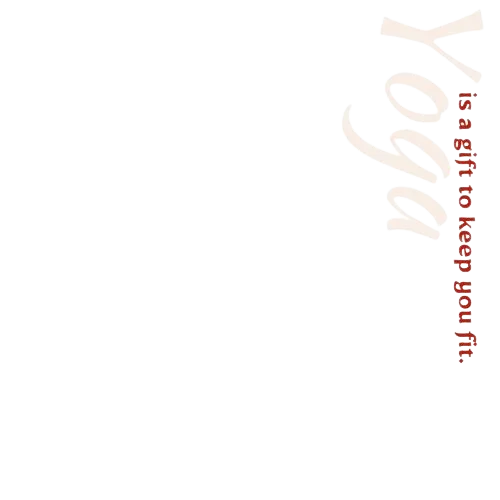
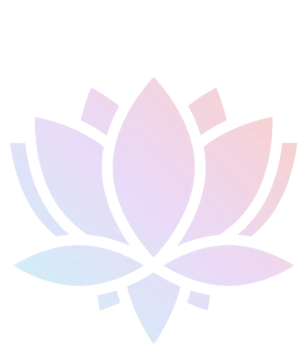
Welcome to Aatm Yogashala for the 100 Hours Hatha Yoga Teacher Training Course in Rishikesh, and experience yoga like never before! This beginner-level yoga teacher training course is deemed to prepare you for a further next level of yoga teachers, i.e., RYT 200 and so on. It will carve your yogic skills and knowledge.
100 Hour Yoga TTC is the only way to go if you have dreamed of as a yoga teacher! The first step of your yogic journey will be a curious practice to explore your body for the first time.
The 11-day yoga course is a yoga vacation full of yoga education! A practice to start your yogic journey. Necessarily, you are not joining the course to become a certified or professional yoga teacher; indeed, you are experiencing the true and pure magic of yoga.
Under the professional guidance of yog gurus, we let you go deeper into the sea of yogic knowledge & practice.
We ensure that these two weeks will be fully immersed in yoga. We promise yoga lovers and enthusiasts that they will take pleasant and memorable memories of yoga with them, and surely find a way towards an inspiring yoga teacher.
Still, you are waiting...
| Course Name | 100 Hour Yoga Teacher Training |
| Level | Beginner |
| Yoga Style | Multi-style (Hatha, Ashtanga, Iyengar) |
| Duration | 11 Days |
| Module | Residential with Meals |
| Language of Instruction | English |
| Certification | 100-Hour Yoga Course by Aatm Yogashala |
| Venue | Aatm Yogashala |
| Location | Yoga Village, Swargashram, Rishikesh |
| Course Fee | (Private Room - $649 USD) - (Double Sharing Room - $549 USD) - (Triple Sharing Room - $449 USD) |
| Date | Course Fees | Booking | ||
|---|---|---|---|---|
| Private Room | Double Sharing Room | Triple Sharing Room | ||
| 03rd - 13th January | $649 USD | $549 USD | $449 USD | [ Enroll Now] |
| 03rd - 13th February | $649 USD | $549 USD | $449 USD | [ Enroll Now] |
| 03rd - 13th March | $649 USD | $549 USD | $449 USD | [ Enroll Now] |
| 03rd - 13th April | $649 USD | $549 USD | $449 USD | [ Enroll Now] |
| 03rd - 13th May | $649 USD | $549 USD | $449 USD | [ Enroll Now] |
| 03rd - 13th June | $649 USD | $549 USD | $449 USD | [ Enroll Now] |
| 03rd - 13th July | $649 USD | $549 USD | $449 USD | [ Enroll Now] |
| 03rd - 13th August | $649 USD | $549 USD | $449 USD | [ Enroll Now] |
| 03rd - 13th September | $649 USD | $549 USD | $449 USD | [ Enroll Now] |
| 03rd - 13th October | $649 USD | $549 USD | $449 USD | [ Enroll Now] |
| 03rd - 13th November | $649 USD | $549 USD | $449 USD | [ Enroll Now] |
| 03rd - 13th December | $649 USD | $549 USD | $449 USD | [ Enroll Now] |
FREE taxi pick-up (from Dehradun (DED) Airport)
Accommodation with an attached washroom
Yogic Food (100% Vegetarian Meals)
Special Dietary (Raw, Vegan, Gluten-free)
24*7 Free Wi-Fi
Tea 2 times a day (Indian/Ayurvedic/Herbal).
Teaching Materials and Modules
Certificate: 100 Hour Yoga TTC by School
Ayurvedic Panchakarma & Treatment
Air-conditioner (On Additional Charges)
Visa fee/ Airfare
Taxi pick-up from Delhi and Haridwar
Anyone who has completed a 100-hour yoga teacher training program is eligible to apply for a 200 Hour Yoga TTC, a standard distinction in yoga teacher training internationally. At Aatm Yogashala, you will be in a position to advance your knowledge of yoga to a professional level of teaching yoga. The students of our school can also join the Yoga Alliance to become registered yoga teachers, such as RYT 200 and RYT 500, depending on the level of their training.
EvaluationA total assessment of 100 hours of Yoga teacher training with Aatm Yogshala India would be based on the following assessment:
Techniques, Training, and Practice
Asana | Assignment | Pranayama | Meditation
Anatomy & Physiology
Yoga Humanities
History | Philosophy | Ethics
Professional Essentials
Teaching Methodology | Professional Development | Practicum
Asana is an initiating pose of yoga. Also called the Seated posture, it preconditions other asanas to be practiced. The asana is practiced in any or all styles of yoga, i.e., Hatha, Ashtanga, Vinyasa, and Iyengar. It entails Methodology and Asana Practice. The postures should be put into daily practice for 3-4 hours. The students are initiated into various types of yogic postures progressively in terms of increasing the level of difficulty of the posture. When the fundamental practice of Asana is accomplished, then students are exposed to asana flows, adjustments, and awareness and breathing of subtle things.
Pranayama is a breathing practice, a breath control technique. "Prana" means "Life Energy," and "Yama" means "Control," thus meaning control of breath or life energy. It consists of Physiology, Methodology & Practicum. Pranayama is the technique of mastering the breath or vital energy in the body. In this subject, the students learn techniques of breath control and operation with vital energy in the center of the body. It is a crucial subject in order to make our students professionally good enough for their Yogic career.
Mudra, in simple language, can be defined as a sign language or gesture, but this is used to reflect the state of mind by finger actions. The awakening of the internal and dormant force of the body of the yogi takes place. Among the yoga mudras, we have the Jnana/Gyan Mudra, Chinmaya Mudra, Vayu Mudra, Agni Mudra, Varun Mudra, Prana Mudra, as well as Surya Mudra.
Bandha is the term used to describe holding, tightening, binding, or locking. Regularly practicing it causes the prana energy to begin in some particular part of the body. It awakens Kundalini by controlling the Prana.
Meditation is a restful state of mind. It is an exercise of the mind that entails relaxation, concentration, and attention. This is normally practiced on a one-on-one basis when one is in a relaxed sitting posture with the eyes closed. It is a relevant topic for our learners to make them professionally competent for their Yogic future.
Mantra Chanting: The chanting of a mantra is a religious activity. However, in addition to this, it is strongly advisable in matters of emotional and mental balance. By repeating the mantras, you release stress and enter into a space of joy.
Yoga philosophy is dualistic as well. Yoga Darshan or Philosophy is aimed at presenting the way in which one may walk and spend their life. It has the background and foundation of Yoga philosophy, history, and thoughts of yoga. It is a mixture of both ancient Yogic traditions as well as modern-day life.
Yoga consists of the structure and parts of the body. Prior to practicing a specific yoga asana, it is necessary to be informed about the organization and operation of the body. It addresses Anatomy Study and knowledge of the details of physiology and anatomy to enhance the efficiency of classroom explanations, asana corrections, and cues.
Ayurveda is the ancient medical practice of health science that has been practiced for ages in India. The herbs and natural medicine of India are so unique, not only cure the body, but also set the work to cure further diseases or illnesses.
Shatkarma is a cleansing process made up of 6 yogic cleansing practices, also written about in early texts of yoga. It also has the name Shatkriya. With these six activities, the whole human body is purified. The Shatkarma class describes all six kriyas in detail, which include Dhauti, Basti, Neti, Trataka, Nauli, and Kapalbhati. Hatkarma-This consists of the purification of the body in the early morning as part of the practices of various Asanas.
Yoga concerns the body's basics and parts. We need to understand the structure and function of the body before practicing a specific yoga asana. It walks through Anatomy Learning and understanding of any part of physiology and anatomy towards greater efficiency in explaining the classroom and correcting asanas and cues. Perfecting how to learn matters more in a teaching training course because, as much as impartation of knowledge is important, so is how to pass it to others. The Teaching Methodology class is significant because it assists in the general approach to ensure that you become a good yoga instructor.
During a Yoga Alignment and Adjustment, the class is very crucial because it makes the adjustments using the asana and corrects your posture.
Yoga Therapy is the disease prevention process that is achieved by the yogic actions. Yoga therapy aims to cure all kinds of diseases through the utilization of all yogic processes asanas, pranayama, etc. These processes affect the body, especially at a subtle to a gross level.
The 100-hour Yoga Teacher Training Course at Atam Yogashala is adhered to in the strict sense with regard to the requirements of the Yoga Alliance. Approximately 6 or 7 hours of each day are dedicated to a yoga-related activity. The training may be an intense yet eye-opening test.
| TIME | ACTIVITY |
|---|---|
| 06:00 - 06:45 am | Pranayama |
| 07:00 - 08:30 am | Hatha Yoga Asana |
| 08:30 - 09:45 am | Breakfast & Rest |
| 10:00 - 11:00 am | Philosophy |
| 11:15 am - 12:15 pm | Ayurveda & Anatomy |
| 12:30 - 01:30 pm | Adjustment-Alignment |
| 01:30 - 02:00 pm | Lunch |
| 04:00 - 05:30 pm | Ashtanga-Vinyasa Asana |
| 05:30 - 06:00 pm | Tea & Relax |
| 06:00 - 07:00 pm | Meditation & Mantra Chanting |
| 07:00 - 07:30 pm | Self-study |
| 07:30 - 08:00 pm | Dinner |
Opening Hawan (Fire Ceremony)
Parmarth Niketan Ashram
Kunjapuri/Balkumari Temple
Yoga by the Ganges
Meditation Cave Tour (Mouni/Vashishtha)
13th floor Bhootnath Temple (Sunset view)
Classical Music Concert (with Gurukul students)
Dance Class (Bollywood, Classical)
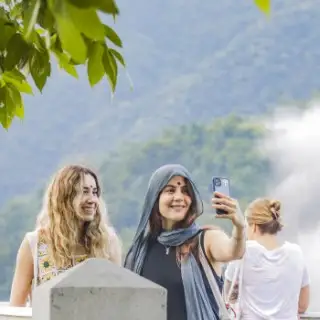
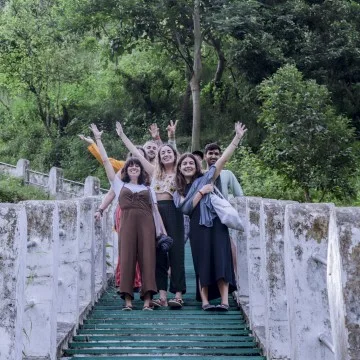
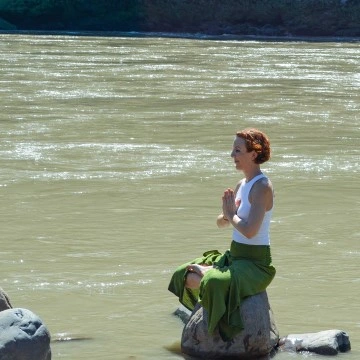
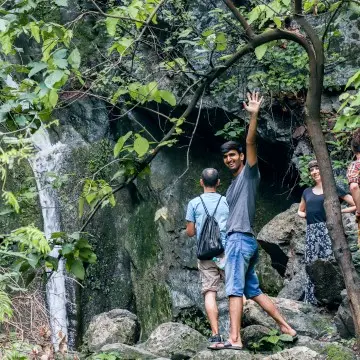
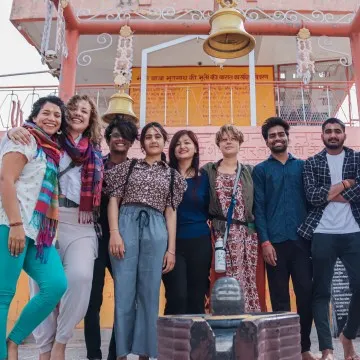
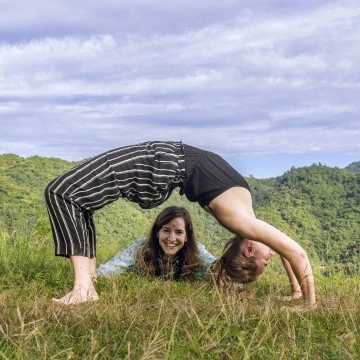
Food not only determines our physical health, but also our thinking and feelings. Yoga does not divide food into protein, carbohydrate, and fats; it divides it into the influence on the body and the mind into three types: sattva, rajas, and tamas
Aatm Yogashala offers accommodations which are a sparkling combination of Indian traditions and modern amenities to make the student feel a part of home out of his/her site and a good place to work as a learning environment in yoga. Both the Yoga halls at Aatm are clean, neat, and have ample space in the lap of nature. We are persistent when it comes to providing our students with the most adequate environment to learn yoga hence our yoga halls are located at the lap of nature along the locals of the sacred river Ganga, peaceful and quiet surroundings making it apt in achieving the spiritual as well as meditation parts of yoga and at the same time, conducive to a healthy mind and body.
The YTTC lasts about 11 days of 7-hour-a-day training in a given schedule. A typical day starts at 6:00 AM with Pranayama, and is followed by Hatha Yoga, philosophy Lectures, anatomy/Ayurveda Lecture, alignment/adjustment Lectures, Ashtanga-Vinyasa, mantra and meditation Lectures, self-study, and shortly ends by lights-off at 9:00 PM.
Food is based on a 100 percent pure vegetarian, Sattvic to Rajasic herbal diet designed to sustain physical and mental equilibrium. Examples of the foods include fresh fruits, tea, porridge, salad, lentils, soups, curries, desserts, herbal tea, and Ayurvedic refreshments, among others.
Bethel accommodation, where traditional Indian style blends with modern convenience, includes. Private or twin share rooms with western-style en-suite. hospitality has facilities like 24/7 complimentary Wi-Fi, a wardrobe, a chair, a ceiling fan, hot and cold water, a balcony, a garden, a terrace, & a dining area. The yoga halls are big, peaceful, and next to the Ganges – perfect for some spiritual practice.
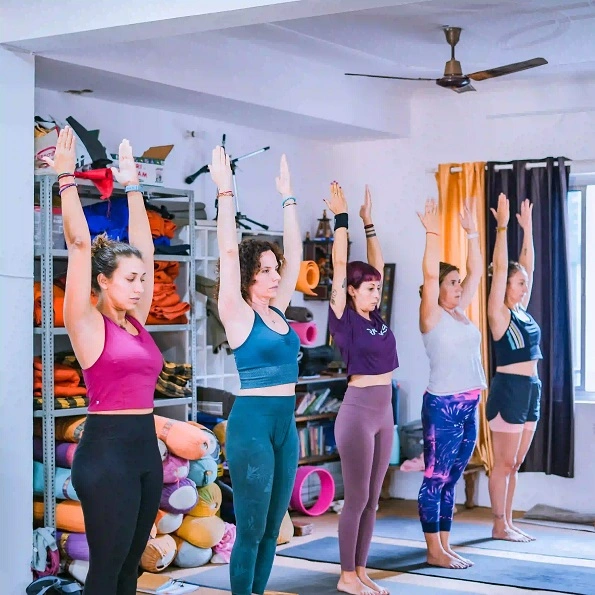
200 Hour Yoga TTC is a gateway to the Yoga Alliance. This is a 24-day course for becoming a certified teacher with RYT 200 Hours by Aatm Yogashala in compliance with Yoga Alliance.
Course Highlights:
Course Fees:
300 Hour Yoga TTC is an advanced course for deepening the study of Yoga. This course will last for 35 days with RYT 300 Hour by Aatm Yogashala in compliance with Yoga Alliance.
Course Highlights:
Course Fees: